

Five months ago, Dr. Phillip Schnarrs, assistant professor in the College of Education and Human Development’s Department of Kinesiology, Health, and Nutrition, and a team of researchers, community members, and medical professionals started the Austin Pre-Exposure Prophylaxis (PrEP) Access Project, a low-cost HIV prevention clinic in downtown Austin. Since opening, the Austin PrEP Access Project, which is the only stand-alone clinic of its kind in the United States, has changed the lives of nearly 150 people...and counting.

“The Austin PrEP Access Project’s vision is to increase awareness, access, and adherence to PrEP for HIV prevention,” said Schnarrs. “We provide insurance navigation and co-pay assistance programs, a free clinic, and conduct HIV prevention research and community outreach and education.”
Schnarrs now plans to bring the PrEP Access Project to San Antonio with the help of the South Texas Consortium for HIV and STI Research (Consortium), a collaboration between The University of Texas at Austin, The University of Texas Health Science Center San Antonio (UTHSCSA), the South Texas Veteran Health Care System, and the San Antonio Military Medical Center.
“We are in the process of trying to figure out how to best increase awareness and access to PrEP in San Antonio,” said Schnarrs, who also serves as the research director for the Austin PrEP Access Project. “With a changing culture regarding PrEP and a developing support network for PrEP, we realized that this might be the time to begin to build capacity to support this project and seek funding from the National Institutes of Minority Health and Health Disparities.”
Like the Austin project, PrEP Access San Antonio (PASA) will provide individuals with information about and access to PrEP, an FDA approved, HIV prevention medication. PrEP is given to HIV negative people to prevent them from contracting the virus.
“Recent research out of San Francisco has shown that PrEP has the potential to reduce transmission of HIV by more than 90 percent, which is more effective than condoms,” said Schnarrs. “In a more recent study, zero men out of 625 participants contracted HIV over a two and a half year period.”
In addition to PrEP access, outreach, and education, PASA will also help patients find ways to make the medication, which can cost up to $1,500 a month, more affordable. At the Austin PrEP Access Project, more than 95 percent of the patients have access to PrEP for free.
“PASA and the Consortium have the potential to significantly reduce the number of new cases of HIV in San Antonio and South Texas,” said Schnarrs. “Once more San Antonians become aware of PrEP and its effectiveness in preventing HIV transmission, there will be an incredible need regarding access.”
Working with the Consortium, Schnarrs said, has allowed PASA to develop in a significantly different way than the Austin project.
“The size and diversity of San Antonio is something unlike what we experienced in Austin,” said Schnarrs. “PASA will require more than a centralized clinic with one group educating the community and advocating for PrEP. The Consortium has allowed HIV researchers from medicine, nursing, pharmacology, public health, sociology, and a variety of other areas, to work directly with AIDS services organizations and private practice physicians in developing increased capacity for PASA.”
research in conjunction with the Austin PrEP Access Project and the Texas Department of State Health Services. The Austin PrEP Access Project has already established partnerships with organizations around the country, such as the Valley AIDS Council, the Center for Excellence in Transgender Health in San Francisco, the Gender Justice League in Seattle, and the Center for HIV Educational Studies in Training in New York.
Unlike the Austin project, PASA will have specific research programs targeting various groups in the San Antonio and South Texas region. One such program is PrEPárate, a multisite project examining awareness, access, uptake and adherence of PrEP among Latinos in South Texas, San Antonio, Southern California, and New York City. Other research projects include College PrEP, PrEP and Young Men who Have Sex with Men, and iPrEP.
“The eventual goal is to develop PrEP and sexual health clinics across the state as a way to reduce the number of new HIV cases in Texas to zero,” said Schnarrs.
Currently, Schnarrs has a partnership in the works with medical students at UTHSCSA to open a free, student-run LGBTQ clinic at the UTSA Downtown Campus. The clinic is slated to open sometime in 2017. Schnarrs also hopes to house one of the PASA clinics at the Downtown Campus as well.
“For me, community and sexual health research is not just about reducing risk behaviors and improving health outcomes,” said Schnarrs, who is also working with the Walter Reed Army Institute of Research’s Military HIV Research Project. “It’s more so about empowering the disenfranchised, building community capacity for political and social mobilization, and using my privilege to help dismantle systems of oppression.”